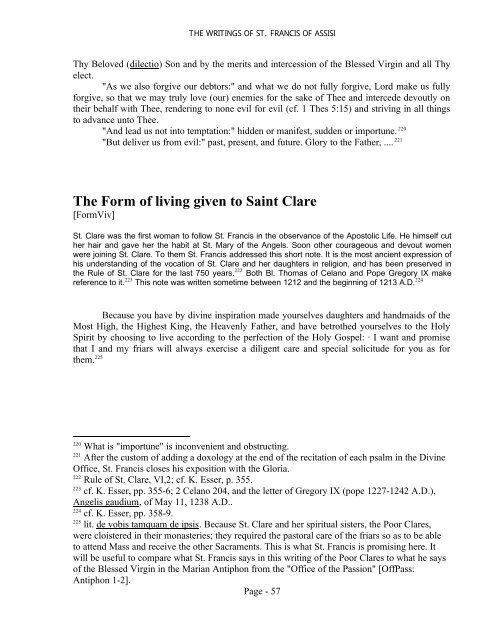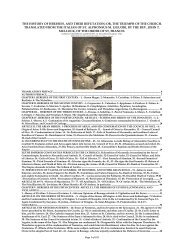The Writings of St. Francis of Assisi - + Saints' Works
The Writings of St. Francis of Assisi - + Saints' Works
The Writings of St. Francis of Assisi - + Saints' Works
Create successful ePaper yourself
Turn your PDF publications into a flip-book with our unique Google optimized e-Paper software.
THE WRITINGS OF ST. FRANCIS OF ASSISI<br />
Thy Beloved (dilectio) Son and by the merits and intercession <strong>of</strong> the Blessed Virgin and all Thy<br />
elect.<br />
"As we also forgive our debtors:" and what we do not fully forgive, Lord make us fully<br />
forgive, so that we may truly love (our) enemies for the sake <strong>of</strong> <strong>The</strong>e and intercede devoutly on<br />
their behalf with <strong>The</strong>e, rendering to none evil for evil (cf. 1 <strong>The</strong>s 5:15) and striving in all things<br />
to advance unto <strong>The</strong>e.<br />
"And lead us not into temptation:" hidden or manifest, sudden or importune. 220<br />
"But deliver us from evil:" past, present, and future. Glory to the Father, .... 221<br />
<strong>The</strong> Form <strong>of</strong> living given to Saint Clare<br />
[FormViv]<br />
<strong>St</strong>. Clare was the first woman to follow <strong>St</strong>. <strong>Francis</strong> in the observance <strong>of</strong> the Apostolic Life. He himself cut<br />
her hair and gave her the habit at <strong>St</strong>. Mary <strong>of</strong> the Angels. Soon other courageous and devout women<br />
were joining <strong>St</strong>. Clare. To them <strong>St</strong>. <strong>Francis</strong> addressed this short note. It is the most ancient expression <strong>of</strong><br />
his understanding <strong>of</strong> the vocation <strong>of</strong> <strong>St</strong>. Clare and her daughters in religion, and has been preserved in<br />
the Rule <strong>of</strong> <strong>St</strong>. Clare for the last 750 years. 222 Both Bl. Thomas <strong>of</strong> Celano and Pope Gregory IX make<br />
reference to it. 223 This note was written sometime between 1212 and the beginning <strong>of</strong> 1213 A.D. 224<br />
Because you have by divine inspiration made yourselves daughters and handmaids <strong>of</strong> the<br />
Most High, the Highest King, the Heavenly Father, and have betrothed yourselves to the Holy<br />
Spirit by choosing to live according to the perfection <strong>of</strong> the Holy Gospel: · I want and promise<br />
that I and my friars will always exercise a diligent care and special solicitude for you as for<br />
them. 225<br />
220 What is "importune" is inconvenient and obstructing.<br />
221 After the custom <strong>of</strong> adding a doxology at the end <strong>of</strong> the recitation <strong>of</strong> each psalm in the Divine<br />
Office, <strong>St</strong>. <strong>Francis</strong> closes his exposition with the Gloria.<br />
222 Rule <strong>of</strong> <strong>St</strong>. Clare, VI,2; cf. K. Esser, p. 355.<br />
223 cf. K. Esser, pp. 355-6; 2 Celano 204, and the letter <strong>of</strong> Gregory IX (pope 1227-1242 A.D.),<br />
Angelis gaudium, <strong>of</strong> May 11, 1238 A.D..<br />
224 cf. K. Esser, pp. 358-9.<br />
225 lit. de vobis tamquam de ipsis. Because <strong>St</strong>. Clare and her spiritual sisters, the Poor Clares,<br />
were cloistered in their monasteries; they required the pastoral care <strong>of</strong> the friars so as to be able<br />
to attend Mass and receive the other Sacraments. This is what <strong>St</strong>. <strong>Francis</strong> is promising here. It<br />
will be useful to compare what <strong>St</strong>. <strong>Francis</strong> says in this writing <strong>of</strong> the Poor Clares to what he says<br />
<strong>of</strong> the Blessed Virgin in the Marian Antiphon from the "Office <strong>of</strong> the Passion" [OffPass:<br />
Antiphon 1-2].<br />
Page - 57













